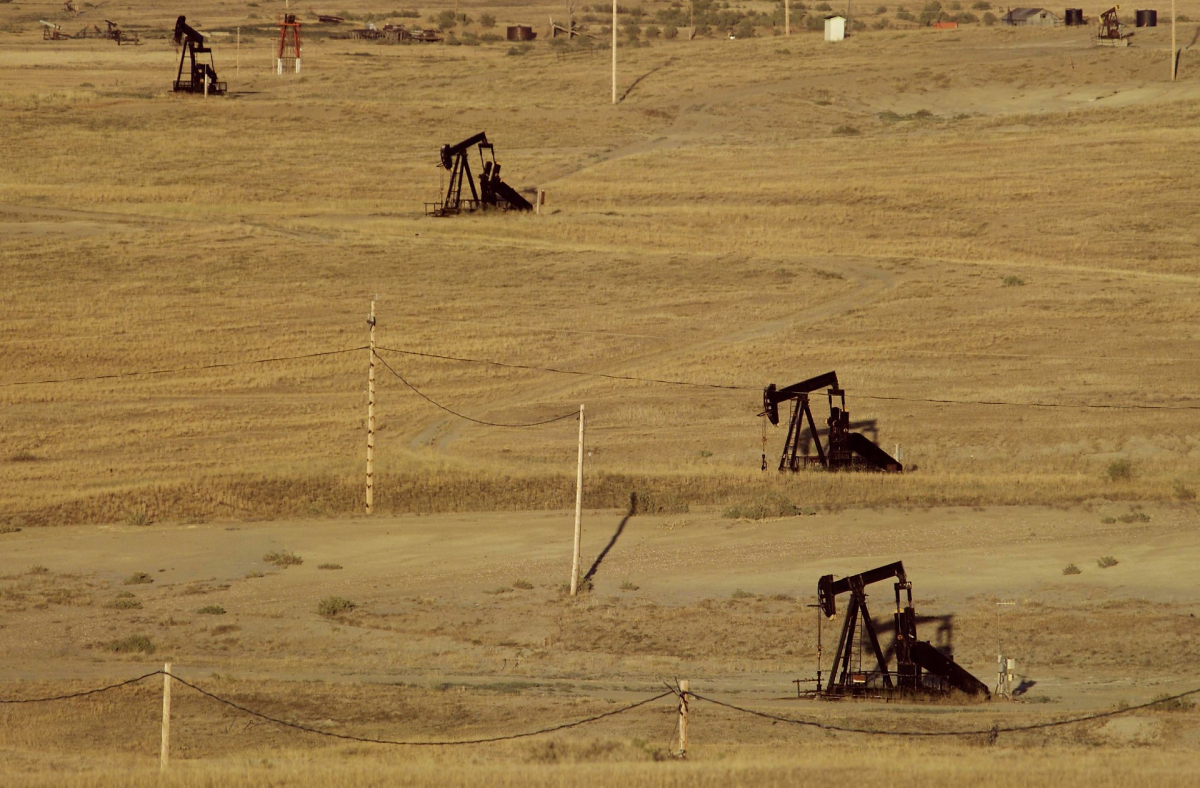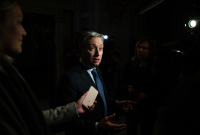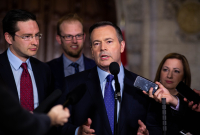Support strong Canadian climate journalism for 2025
For the world to have a shot at limiting global warming to 1.5 C, Canada and other wealthy fossil fuel producing nations need to stop all production by 2034, according to a new report.
The reduction in greenhouse gas emissions required to secure a livable future is “far more challenging” than any global leader is prepared to acknowledge, said Kevin Anderson, one of the authors of the report and a professor of energy and climate change at the University of Manchester. Emissions from fossil fuels are one of the main drivers of human-caused climate change.
Published on March 21, the report by the International Institute for Sustainable Development proposes different phaseout dates for oil and gas producing countries by grouping them according to their differing wealth, development and economic reliance on fossil fuels.
It found there isn’t room for any country in the world to increase fossil fuel production, and wealthy countries like Canada, the U.S. and the U.K. must be the first to end production to give smaller, poorer nations an equitable transition and provide them with financial support. The richest countries, which produce over a third of the world’s oil and gas, must cut output by 74 per cent by 2030 while the poorest, which supply just one ninth of global demand, must cut back by 14 per cent.
If wealthy countries end fossil fuel production by 2034, middle-income countries by 2043 and the poorest countries by 2050, the world will have a 50 per cent chance of keeping global warming below 1.5 C, according to the report.
“Would we be prepared to put our children on a plane with a 50/50 chance they're going to land safely?” Anderson asked. “I think we probably wouldn't … Why is it better to take that risk with their futures?”
A recent report by the Intergovernmental Panel on Climate Change (IPCC) warns that even if countries act urgently and limit global warming to 1.5 C — the threshold scientists say is necessary to maintain a livable planet — the world will still face “unavoidable” and steadily worsening impacts from climate change over the next two decades.
Canada has had a taste of these impacts with the deadly heat wave, floods and wildfires that plagued B.C. last year. Anderson said people in poor countries are already suffering more severe effects of climate change, and warming beyond 1.5 C is “nearly a death sentence.”
“Many people are suffering and dying from climate change a long way from the places that are causing the problems like the E.U., the U.K., Canada, the U.S.,” he said.
The report found wealthy nations must phase out fossil fuel production well before poorer producing nations for there to be any semblance of an equitable transition.
The authors determined how much economic capacity all the fossil fuel producing countries have by calculating each nation’s GDP without oil and gas revenues.
Despite being small fossil fuel producers, countries like South Sudan, Congo-Brazzaville and Gabon have little economic revenue apart from oil and gas production, so rapidly removing this income could threaten their political stability and collapse their economies, said Anderson.
“For some parts of the world, oil and gas is like 60-odd per cent of their economy. If you remove that … they've almost got nothing left,” he said.

Wealthy nations like Canada that are major producers, on the other hand, have very diverse economies and typically remain wealthy even once the oil and gas revenue is removed, said Anderson.
For example, the report says Canada’s GDP would remain the 13th highest globally, even without revenue from oil and gas.
Oil and gas revenues make up 10 per cent of Canada’s GDP, according to the report, which is “not an insignificant amount, but an amount that's relatively easy for us to replace with other sources,” said Catherine Abreu, founder of Destination Zero and a member of Canada’s Net-Zero Advisory Body.
If we “keep up the pretence” that Canada’s oil and gas industry is critical for the country’s economic well-being and it will be “too hard” to transition, “how can we expect anyone else for whom it is actually much more difficult to do it?” asked Abreu.
“Canada's plans for fossil fuel expansion (are) the second largest in the world … So Canada is really one of the worst culprits in putting forward plans for this industry that are really out of step with our commitments in the Paris Agreement.”
The Canada Energy Regulator says that under the country’s current policies, Canadian oil production is projected to keep increasing and peak in 2040 before declining slightly, while gas production will steadily increase to 40 per cent above current levels by 2050. It does not include any scenarios compatible with achieving net-zero emissions by 2050 or holding to 1.5 C.
The phaseout dates in the report were calculated by taking stock of the world’s carbon budget, countries’ total fossil fuel production and their economic ability to phase out coal, oil and gas. Although this method allowed some wiggle room to give poorer countries more time to transition, it is “still not fair for poorer countries” and needs to be paired with “big financial transfers” from wealthy countries, said Anderson.
“Our pathways still (are) unfair on the poorer parts of the world if you look at the total emissions per person over the timeframe that we have,” he said. The fact that women, children and people of colour are most impacted by climate change points to a broader issue of racism embedded in climate action, or lack thereof, Anderson added, and the institutional racism that exists in the Global North also manifests itself globally.
“We've been highly inequitable to people who have suffered those racial injustices for centuries now and we're just layering another racial injustice on top,” he said.
The federal government recently announced that $315 million of Canada’s five-year, $5.3-billion climate finance commitment will be available for organizations in Canada and the Global South to partner on climate adaptation projects, but rich countries — including Canada — are still falling well short of what is needed.
At the end of the month, the federal government will unveil its emissions reduction plan, which Abreu says is the first step to acknowledging Canada has to tackle oil and gas sector emissions. This report makes it clear we need to be going beyond that first step and account for the emissions from the oil and gas we export, not just production, said Abreu.
The report does not include negative-emissions technologies like carbon capture and storage and nature-based solutions because “they are highly uncertain and speculative, (and) we do not have any examples at scale,” said Anderson.
“It's dangerous to assume that it will work when it's that uncertain,” he said, noting the report’s authors still researched negative-emissions technologies but left them out to avoid increasing the carbon budget without a guarantee it is safe to do so.
“We always ignore the part of the science that tells us actually, the budgets might be much smaller so your policies need to be much more stringent,” he said.
World leaders are gambling if they continue to use more fossil fuels and don’t act urgently to phase them out, he added.
“We're playing Russian roulette with our own children's futures,” said Anderson. “That's what we're doing, spinning the chamber with one bullet in it and holding it up to our children's head at breakfast and saying, ‘Shall we be lucky?’”
Natasha Bulowski / Local Journalism Initiative / Canada’s National Observer







Comments
Stop all production by 2034?
Not going to happen.
The Trudeau Liberals plan on the precise opposite.
Billions of dollars in subsidies for new oilsands export pipelines (TMX); carbon capture (CCS); SMRs for oilsands projects; and blue hydrogen (derived from natural gas). Huge infrastructure projects take decades to recoup costs. You don't build big infrastructure projects only to run them for a decade.
Any O&G industry emissions cap will apply to upstream operations only. No production cap in sight.
Last election everybody told us to vote for the "climate-sincere" Liberals.
The "climate-sincere" Liberals sincerely intend to derail climate action in Canada. The Liberals serve "climate-sincere" Big Business, the Big Banks, and Big Oil — which sincerely intend to derail climate action around the world.
Big Oil sincerely intends to extract every last dollar from sunk capital costs; expand production; keep the world dependent on its products; and keep profits flowing. Big Oil has no intention whatever of voluntarily going out of business or switching to renewables. Energy "transition" has become energy "diversification", with fossil fuels providing the bulk of our energy needs and baseload power.
No one should be surprised. We all knew what we were voting for.
Evidently, not enough people have died yet in heatwaves. Not enough towns reduced to ashes. Not enough people asphyxiated by ash-filled skies. Not enough houses lost to sea level rise.
Any volunteers?
Trudeau (2016): "There is growth to be had in the oilsands. They will be developing more fossil fuels while there's a market for it, while we transition off fossil fuels."
Trudeau (2017): "No country would find 173 billion barrels of oil in the ground and just leave them there." (Keynote address at the CERAweek Global Energy and Environment Leadership Award Dinner, Houston, March 9, 2017)
"And, between Trudeau's 2017 speech promoting tar sands expansion to fossil fuel CEOs in Houston, Jonathan Wilkinson's social media looking like a Shell advertising campaign, or Seamus O'Regan forming a secret committee with Big Oil during the pandemic, this lobbying seems to have an effect. With this, it's fair to be worried that Trudeau and his cabinet are already drinking the fossil fuel kool-aid when it comes to the timeline for a transition."
"Don't 'bothsides' the just transition"
https://www.nationalobserver.com/2021/10/15/opinion/dont-bothsides-just…
The Liberals propose to "green" fossil fuels — not get off them.
According to the Liberals, the path to energy transiton runs through a massive spike in fossil-fuel combustion and emissions. Complete disconnect from the science.
When the IPCC issued its latest report, then-Environment Minister "Wilkinson reaffirmed Canada's commitment to phasing out fossil fuels and achieving net zero carbon emissions by 2050, but said achieving that target WILL REQUIRE MONEY GENERATED BY FOSSIL FUELS."
"Ottawa says it needs revenue generated by the Trans Mountain pipeline to fight climate change" (CBC, 9-Aug-21)
https://www.cbc.ca/news/politics/wilkinson-climate-report-1.6135502
New pipelines to fight climate change.
Article: "Oil and gas revenues make up 10 per cent of Canada’s GDP, according to the report, which is 'not an insignificant amount, but an amount that's relatively easy for us to replace with other sources,' said Catherine Abreu, founder of Destination Zero and a member of Canada’s Net-Zero Advisory Body."
Much less, in fact.
NRCan: In 2019 Canada's energy sector directly and indirectly contributed 10.2% ($219 billion) to Canada's GDP ($2.151 trillion). Including oil & gas, nuclear, hydro, coal, and renewables.
In 2019 Canada's energy sector directly contributed 7.2% ($154 billion) to GDP.
Petroleum accounted for 5.3% ($114 billion). Crude oil a fraction of that. AB's oilsands a fraction of that.
https://web.archive.org/web/20210611032204/https://www.nrcan.gc.ca/scie…
O&G numbers were even lower in 2020.
In 2020 Canada's energy sector directly and indirectly contributed 8.1% ($168 billion) to Canada's GDP ($2.082 trillion). Including oil & gas, nuclear, hydro, coal, and renewables.
In 2020 Canada's energy sector directly contributed 5.8% ($121 billion) to GDP.
Petroleum accounted for 3.9% ($81.4 billion). Crude oil a fraction of that. AB's oilsands a fraction of that.
https://www.nrcan.gc.ca/sites/nrcan/files/energy/energy_fact/2021-2022/…
Subtract (astronomical) externalized environmental, climate change, and health costs. Subtract lost jobs in other industries, towns wiped off the map, billions of sea animals dead in a week. Subtract subsidies. The fossil fuel industry is killing us.
AB's oil & gas industry has barely started to fund its clean-up liabilities: north of $260 billion. How much of that bill will our "strategic" industry foist upon taxpayers?
"AB's oil & gas industry has barely started to fund its clean-up liabilities: north of $260 billion. How much of that bill will our "strategic" industry foist upon taxpayers?"
All of it [externalized costs], one way or the other.
So do you want to pay via progressive payroll taxes, or through gas-pump taxes, or fuel costs, or in Alberta's case, by spending oil and gas royalties? But if we don't pay, it won't stop.
Follow the polluter-pay principle.
Yes, oil companies pass on higher costs to consumers. So they should. Why should consumers not pay the full costs of the energy they use upfront? In a free market, taxpayers do not subsidize producers and consumers at all.
Burdening taxpayers with industry's and consumers' costs violates the polluter-pay principle.
Why should taxpayers have to subsidize (pay the pollution and clean-up costs of) fossil-fuel producers/consumers? Fossil fuel producers/consumers receive the benefits and cause the damage -- they alone should pay the tab. Leave taxpayers out of it.
Precisely the rationale for carbon taxes. Carbon levies apply to consumers, not taxpayers, expressly to discourage consumption.
Carbon pricing (not a tax) internalizes the previously externalized costs of fossil fuels. A realistic price on carbon forces fossil fuel producers and consumers to pay the full costs of the energy they use — instead of dumping those costs on society.
If polluters pay to clean up their own mess, less profits flow into shareholders' pockets. Smaller bonuses for oil execs. Why reward them for destroying our future?
Why should low- or non-consuming taxpayers pay more in tax to subsidize big consumers and fossil-fuel profits (corporate shareholders)? Not everybody owns a car or drives. Why should someone who walks or bikes to work subsidize the fuel costs of someone who commutes 100 km every day?
Drivers who drive big gas guzzlers everywhere they go consume more fossil fuels. Of course, they should pay more.
Better that consumers pay climate change and cleanup costs in proportion to their fossil fuel usage and emissions than saddle taxpayers with the costs irrespective of usage and emissions. That gives consumers an incentive to use less energy.
P.S. Deferring clean-up and reclamation costs (kicking the can down the road) shifts the burden to future (generations of) taxpayers, who neither benefit from the oil consumption nor cause the damage.